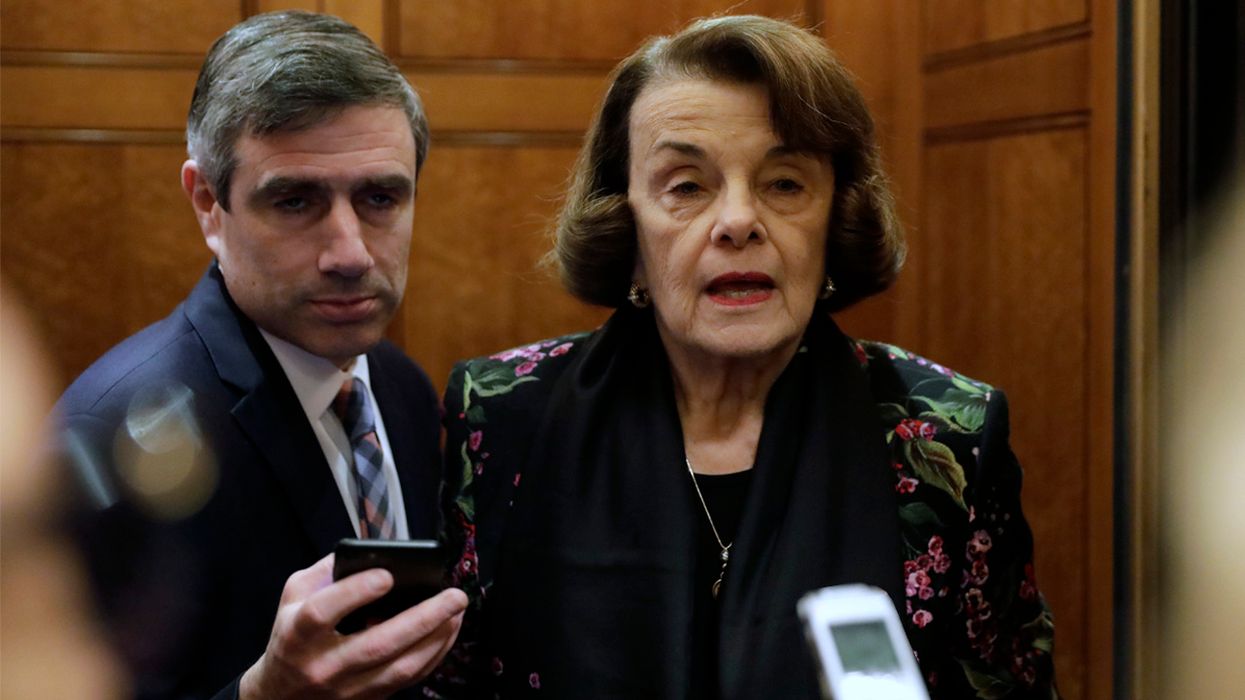
(Yuri Gripas/Bloomberg via Getty Images)

(Yuri Gripas/Bloomberg via Getty Images)
Without an exposed iPhone screen we may never have known.
The United States sent a carrier strike group to the Middle East to send an "unmistakable message" to Iran early this month. That message was made even more crystal just a few weeks later when President Trump issued a blunt threat never to mess with the US.
Tensions, in other words, have been extremely elevated, and the stakes incredibly high. Personnel have been called back. Assets have been moved. Footing, as they say, shifted.
While all that was going on between the people whose job it is to do such things and the country toward home that posture was taken, Democrat Sen. Dianne Feinstein caught a bite to eat with an Iranian Foreign Minister and it took Politico to bring it to light. In a pretty amazing way.
It started with an exposed iPhone screen. Here's what Politico wrote:
SPOTTED: SEN. DIANNE FEINSTEIN (D-Calif.), who sits on the Senate Intelligence Committee, walking around the Capitol with her iPhone screen facing outward in full view, and Javad Zarif's contact page on the screen. Zarif is the name of Iran's foreign minister.
After seeing Iranian Foreign Minister Javad Zarif's name on her screen, they asked about it.
That's called good reporting.
They spoke to Feinstein communications director Tom Mentzer, who told them he "can't comment on who the senator does or doesn't speak with."
Later, they got a statement from her office: "War isn't necessary to solve a problem when both sides want a solution. I urge Secretary Pompeo to reach out to Foreign Minister Javad Zarif, who I know doesn't want to see a conflict with the United States."
That's called confirmation. On Saturday, more confirmation came when a spokesperson for the Iranian Mission to the UN confirmed from their side. "The meeting took place as our routine meetings with members of Congress," Alireza Mir Yousefi said in a report from Iran's state news.
Feinstein's office also said that the dinner was arranged "in consultation with the State Department." Except the State Department says that is not so.
A State Department official told us that they did not ask Feinstein to go to the dinner with Zarif, a smooth-talking, American-educated Iranian diplomat who worked on the nuclear deal with John Kerry.
Well isn't that curious.
And what's more, as the New York Post points out, it's not just that a Senator met with a hostile foreign power's representative without coordinating it through the State Department or the administration in the White House, it's not even just the fact that this particular diplomat worked closely with the previous administration on a deal that is no longer on the table.
It's that the particular Senator happens to be a leading voice in reinstuting that deal, and who publicly blames this administration, and by extension official U.S. policy, for the current state of tension. Not blaming, in other words, the threat against Americans in Iraq or the sponsoring of terror against our ally Israel. No, blaming us.
Oh also the fact that this foreign minister she had tea and crumpets and negotiations pie with happens have just "warned" the United States not to send more troops to the region.
At Politico, no Trump administration fans there, they said in a perhaps understated way that it's "a bit unusual that Feinstein, the former chair and vice chair of the Intelligence Committee and a member of the Senate minority, is dining with the foreign minister of an adversary."
Yes. That is unusual. Secretary of State Mike Pompeo said when asked about it that "it's unusual, and more importantly, it's wrong." He was referring specifically to Feinstein, as well as to John Kerry and others involved in the old Iran Deal who continue to meet with representatives of Iran on their own and outside of the structure of our government and the way foreign policy is crafted and conducted.
"They had their day, it's time to get off the stage," said Pompeo. "These acts border — we all know the Logan Act — we all know the risks that is taken when people act as private citizens on behalf of the United States government."
The Logan Act forbids unauthorized persons from having private meetings like this, essentially negotiating with hostile foreign governments or governments with which there is a dispute, on behalf of the United States. It was enacted in 1799 and has never been invoked to prosecute anyone.
The U.S. is sending an additional 1,500 troops to the region, and there have been reports that they Pentagon is looking at sending up to 10,000.
Caleb Howe
Contributor